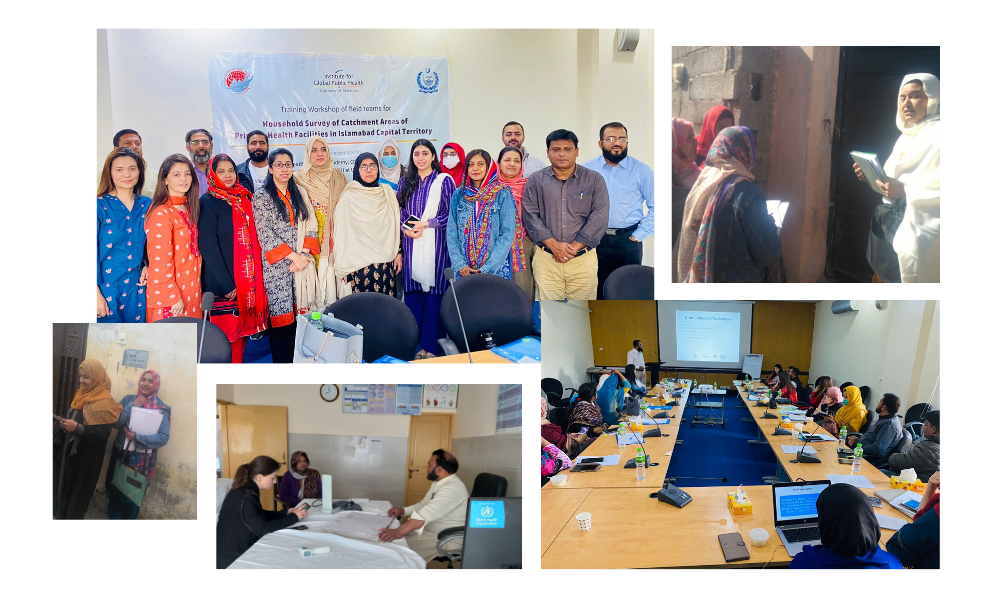Health System Strengthening
-
Development of District Monitoring and Evaluation Framework
-
Adaptation and Service Availability Readiness Assessment (SARA) survey across 12 UHC priority districts (Jan 2020-Dec 2021)
-
Household Survey in Community Catchment Areas of nineteen Public Health Centres (PHC) in ICT (October 2022 – May 2023)
 A national M&E framework has been developed by CGPH-Pakistan working in close coordination with the MoNHSR&C that takes into account the provincial and district levels of Pakistan health system. The district monitoring system will primarily be based on routine health facility information and health system data. The district monitoring systems linked to provincial and national UHC monitoring systems that provide critical and actionable information at the district level. The indicators are linked to the interventions in the UHC Benefit Package but only include a set of tracer indicators. The aim is to come up with the best possible set of tracer indicators which can summarize the annual performance of districts, as large number of indicators are hard to manage and interpret. The monitoring framework for UHC-BP based PHC services, includes a proposed plan of monitoring and the set of activities that should be undertaken to document the progress of implementation, with reference to the inputs, processes, outputs and outcomes. The monitoring system is based on a basic system of data collection and analysis that can provide key information on the selected indicators on an annual basis.
A national M&E framework has been developed by CGPH-Pakistan working in close coordination with the MoNHSR&C that takes into account the provincial and district levels of Pakistan health system. The district monitoring system will primarily be based on routine health facility information and health system data. The district monitoring systems linked to provincial and national UHC monitoring systems that provide critical and actionable information at the district level. The indicators are linked to the interventions in the UHC Benefit Package but only include a set of tracer indicators. The aim is to come up with the best possible set of tracer indicators which can summarize the annual performance of districts, as large number of indicators are hard to manage and interpret. The monitoring framework for UHC-BP based PHC services, includes a proposed plan of monitoring and the set of activities that should be undertaken to document the progress of implementation, with reference to the inputs, processes, outputs and outcomes. The monitoring system is based on a basic system of data collection and analysis that can provide key information on the selected indicators on an annual basis.
It has been proposed that monitoring of UHC indicators at the district level starts with 12 priority districts. So far, it has been adapted for Islamabad Capital Territory (ICT), Charsadda (KPK) and Kasur (Punjab). The framework builds upon a multi-stakeholder workshop conducted in Islamabad in March 2020, and experience with developing a model framework in ICT.
 Pakistan’s National Health Vision and National and provincial Action Plan (2019-2023) aim to ensure provision of quality essential health services to all people through resilient and equitable health care system. To achieve this aim Pakistan became the first country in the world to use Disease Control Priority (DCP-03) global evidence and developed an Essential Package of Health Services (EPHS) to achieve Universal Health Coverage (UHC).
Pakistan’s National Health Vision and National and provincial Action Plan (2019-2023) aim to ensure provision of quality essential health services to all people through resilient and equitable health care system. To achieve this aim Pakistan became the first country in the world to use Disease Control Priority (DCP-03) global evidence and developed an Essential Package of Health Services (EPHS) to achieve Universal Health Coverage (UHC).
Ministry of National Health Services Regulation and Coordination (MoNHSR&C) along with the provincial and District health departments through support from WHO and other stakeholders has planned to extend the UHC EPHS across all districts in Pakistan in phase wise approach. In the first phase 12 priority district work started from 2019. As part of monitoring the health system response to increased input and improved processes over time; information gap for up-to-date information was obtained using WHO health facility assessment tool “Service Availability Readiness Assessment (SARA)”. CGPH-Pakistan closely worked with (MoNHSR&C), Provincial and District health departments along with Health Services Academy (HSA) to adapt the SARA tool to Pakistan context.
 The ICT Community health need assessment survey was the first exclusive survey conducted by CGPH-Pakistan under guidance of University of Manitoba, in collaboration with Health Services Academy under the leadership of Ministry of National Health Services Regulations and Coordination and ICT Health Department. The survey assessed in identifying the community’s knowledge of health services, health needs, health services utilization patterns and the health care seeking behavior in the catchment area of the PHC. It also helps in identifying health risks and assessing the gaps in health opportunities within that population. The information collected through this survey will assist policymakers and health managers at the federal and district level, and at the primary health care level, in evaluating and designing programs and strategies for improving the community’s health.
The ICT Community health need assessment survey was the first exclusive survey conducted by CGPH-Pakistan under guidance of University of Manitoba, in collaboration with Health Services Academy under the leadership of Ministry of National Health Services Regulations and Coordination and ICT Health Department. The survey assessed in identifying the community’s knowledge of health services, health needs, health services utilization patterns and the health care seeking behavior in the catchment area of the PHC. It also helps in identifying health risks and assessing the gaps in health opportunities within that population. The information collected through this survey will assist policymakers and health managers at the federal and district level, and at the primary health care level, in evaluating and designing programs and strategies for improving the community’s health.